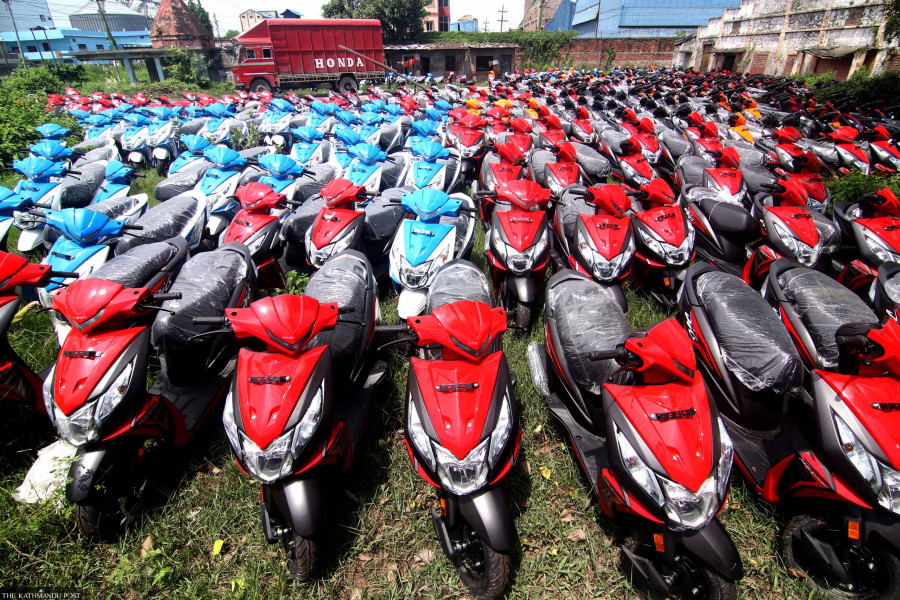Money
Banks to ‘discourage’ traders from opening Letters of Credit for luxury goods
Ballooning imports have led to foreign currency going out, pushing balance of payments into the red, officials say.
Krishana Prasain
Nepali banks said they would follow the central bank's “verbal directive” to "discourage" traders from opening Letters of Credit (LC) to import non-essential goods in an effort to stem the outflow of the country's rapidly depleting foreign exchange reserves.
Ballooning imports in recent months have led to massive amounts of foreign currency going out of the country, pushing the balance of payments into the red and raising concerns of a crisis, officials said.
According to bankers, they have not received a formal communication to this effect from the central bank.
“But acting on Nepal Rastra Bank’s instructions, we have discouraged the opening of LC for non-essential goods,” said Anil Kumar Upadhyay, president of the Nepal Bankers’ Association
“We have not restricted the opening of LC to import essential goods or production-oriented and agricultural products,” he said.
Imports jumped by 42.8 percent to Rs1.14 trillion during the first seven months of fiscal 2021-22, against an increase of 0.01 percent last year.
Purchases of petroleum products, medicine, crude palm oil, crude soybean oil, transport equipment, vehicles and parts, among others, have increased sharply.
According to Nepal Rastra Bank, the balance of payments showed a deficit of Rs247.03 billion in the review period against a surplus of Rs97.36 billion in the same period of the previous year.
The current account recorded a deficit of Rs413.86 billion in the review period, up from a Rs104.39 billion deficit in the same period of the previous year.
Gross foreign exchange reserves had plunged by 16.2 percent to Rs1.17 trillion as of mid-February 2022, down from Rs1.39 trillion in mid-July 2021.
"The central bank’s decision to restrict imports of luxury goods temporarily is intended to avoid a probable economic crisis, considering the current economic indicators," said Gunakar Bhatta, spokesperson for Nepal Rastra Bank.
“We have not directed banks to open LC for any particular goods,” he said.
“The central bank is trying to control imports to conserve foreign exchange reserves to avoid a financial crisis,” said Upadhyay, who is also the CEO of Agricultural Development Bank.
According to the central bank, an immense portion of bank loans has gone into paying for imports, so the country is short of money to finance economic activities needed to recharge the economy devastated by Covid-19.
"If imports maintain this pattern, it will put stress on the country's foreign currency reserves and impact the economy as a whole," Upadhyay said. “And we might not be able to control it.”
Bhatta said that the credit-deposit ratio of almost all banks was above 90 percent, which means they do not have enough cash.
“We are taking precautionary measures as we are still in a comfortable position in terms of foreign currency reserves which are enough to pay for the import of goods and services for seven months,” he said.
“Remittance has not increased, tourism revenues are still low, and capital expenditure is down. Resources like these should have increased enormously, but it did not happen.” Upadhyay said.
The tourism sector is one of the major contributors to Nepal’s foreign currency reserves.
According to Nepal Rastra Bank, remittances decreased by 4.9 percent in the first seven months of the current fiscal year ended mid-February.
Automobiles, cosmetics, dried fruits, betel nuts, gold and silver are classified as luxury goods.
Last December, Nepal Rastra Bank unveiled a new policy making it mandatory for importers to keep 100 percent margin amount to open an LC to import 10 types of listed goods.
Importers of motorcycles, scooters and diesel-powered private automobiles have to maintain a 50 percent margin of the document amount. The central bank has decided to discourage the import of these goods considering that they are “non-essential”.
Also, traders need to keep 100 percent margin amount to open an LC to import alcoholic drinks, tobacco, silver, furniture, sugar and foods that contain sweets, glucose, mineral water, energy drinks, cosmetics, shampoos, hair oils and colours, caps, footwear, umbrellas and construction materials such as bricks, marble, tiles and ceramics, among others.
According to the Department of Customs, Nepal’s imports soared by 38.64 percent year-on-year to Rs1.30 trillion in the first eight months of the current fiscal year ended mid-March.
The total trade deficit rose by 34.50 percent to Rs1.16 trillion during the review period.




 14.24°C Kathmandu
14.24°C Kathmandu















